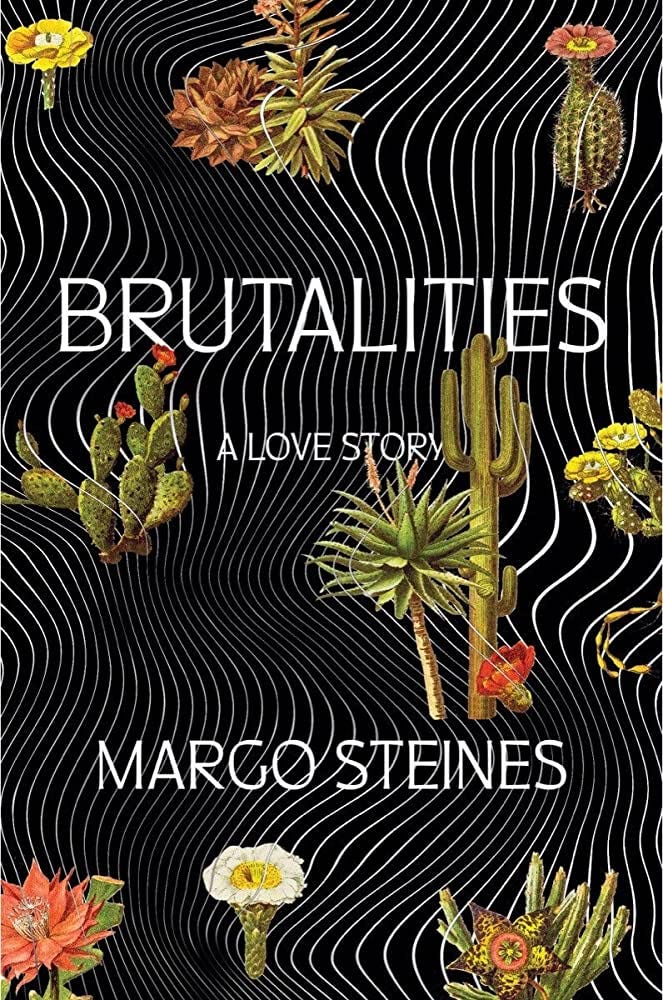LEAVE NO CRUMBS
on Monsters by Claire Dederer, reviews, pretentiousness, hot fries, and choosing to be subjective aka yourself.
I texted Tory that the book was “tonally incandescent,” as if I had searched a thesaurus for “fancy review language.” And then I deleted it and said, “tonally great,” also saying well … pretty much nothing, but it was an attempt to get across that the tone of the book is what captured my attention, not the subject matter or even the argument which began with the Paris Review piece, “What Do We Do with the Art of Monstrous Men?”
I can’t even remember now why I picked the book up, or what recommendation sold me on requesting it from the library. (Should I tell you that I have never even watched Annie Hall?). Here’s how Tory responded:
Yea, yea, that’s what I meant right? It helps to have smart friends.
What book we’re talking about—what I made her read after getting about 75% of the way through, is Monsters: A Fan’s Dilemma by Claire Dederer. It wasn’t necessarily Claire Dederer’s argument that made me push the book her way, but the way she lays out the argument without the pretentiousness I expect from critical nonfiction. If I’m going to read what I expect is “dense nonfiction”—history, criticism, theory, which I haven’t really pursued in postpartum life (my brain is like a pile of used spectacles and I can never find the right pair), then I go in with the expectation that the author will write in a way that might have moments of the conversational, but isn’t going to feel quite “down to earth.” This is the case for most scholarly work, and I would assume (in most circles) one of the reasons that determines whether to take it seriously or not.
It’s an expectation I’ve come to loathe—as if what’s factual and scholarly can’t also be accessible and voice-driven. It’s why I love writers like Mary Roach, who is an expert in doing both/and. It’s why I dropped out of library school a month in, and why writing an academically rigorous thesis simply isn’t in my future. Do I love research? Yes. But the container, the frame, THE TONE with which I can spend time (right now in my life) cannot feel pretentious because to me, pretentiousness feels a little bit like a lie.
And here comes Claire Dederer. Writing criticism, and doing it in form AND voice AND meat by making an explicit argument against the sort of hierarchical, stodgy, objective world of criticism.
Early in the book when talking about her experience watching films with other critics—her experience of having actual emotions in the black box theaters, and their terse, non-feeling attempts (misogyny!), leads to her eventual refusal to accept that objectivity is the way of critique, and instead she embraces subjectivity.
She says,
“We are all bound by our perspectives.”
And later,
“Consuming a piece of art is two biographies meeting: the biography of the artist that might disrupt the viewing of the art; and the biography of the audience member that might shape the viewing of the art. This occurs in every case.”
For me, there’s a spectrum to reviewing. On one end is Goodreads stars and on the other is the formal-objectiveness of scholarly journals. One is too dedicated to the idea of good or bad (as evidenced by this Sarah Stusek’s dropped book this week over a 4-star rant), and the other is too dedicated to pretending the person behind the review is an anonymous no-feeling sea cucumber—a sponge who can take-in a piece of art and leak out an impartial, equitable critique. But the word critique packs emotion, so the objective impossibility exists from the start.
(And also—publishing is having a crisis of identity (has been, but it’s spoken aloud more often these days), of who can write what, of who should write what—which feels like a question akin to the art monster question, another form of monstrosity & gatekeeping & the previously and still slim parameters of how books / what books / where books / whose books—art as some kind of monstrous allowance).
And there are so many types of reviews between these two. Financial Times, mostly summaries. Kirkus, mostly snarky. BOMB, always cool. Bloggers, detailed “I felt …” statements. Literary Hub & New York Times, often essayistic, placing books in a cultural conversation or conversation with each other. And don’t get me started on lists.
But how many of us are convinced by any of these that we should pick up a book? In fact, who’s reading the book recommendations on Forbes? (I mean, okay, business people). Does a singular review on its own really move the purchase power at all? And who keeps the data on this—whether or not a hit actually moved books (I can tell you, publishing makes it *difficult* to know).
This is a question I ask myself everyday. But I think the answer is somewhere in this idea of the subjective / objective, and has a few prongs.
The first, who’s telling you about the book (do you trust them? do you like them? do you have similar tastes?)
The second, how are they telling you about the book? If Tory sends me an all caps text about a book, I order that book baby from the library. If I loved a book by a certain author and they recommend something, I usually add it to my TBR.
The third, have you seen the book before—is it floating in a similar pond to you? Have you seen it too much? There’s a book on my Twitter feed almost every day making a new list, and I’m going to be real with you, it’s in my face so often that I won’t read it for at least several years if at all.
The fourth, what conversations are happening around the book and among who?
A question all writers should ask themselves going into book publicity is what matters. Do you want genuine reviews? Do you want big name national news? Do you want quantity or quality? Do you want to write companion essays and lists and features and op-eds? Do you want anticipated & book of the year lists? Do you have a sales goal or a specific readership goal? Lots of writers tell me they want to reach their audience—but what does this mean to you, and who is it, how do you define them? Ideally, we’re going big or going home, right? And we want all of it, but what really matters the most to you?
Anyway, Claire is right. Attempting objectivity takes away the personhood of those involved in the conversation around a piece of art or book. Subjectivity is a much wider space (and sometimes questions need to be asked to reviewers too—are you really the right person to be reviewing this one? If all you have to say is negative, do you need to write it? Etc. etc), a space for tenacity, ambition, ~feelings.~
For an example, here is the opening to my most successful pitch of the year. It is a brief description of how it felt to read the book in my body.
“As I began reading Brutalities, the spit gathered in my mouth and never left. There is no swallowing it down easy. My heart rate increased, my chest flushed with heat, and I couldn’t find a comfortable way to sit in my chair, to sit in bed, to sit in my body. From the daintiness of a bluebonnet chipped porcelain teacup on her farm homestead to the knife-neck killing of a brand new ewe, her ironwork and Crossfit and saying yes–the first woman to agree–on an exes command to take a camel whip naked in a corner facing the wall, Steines collection lives in the body like a stake.”
It’s not even *close* to objectivity. I didn’t even try.
The reason Twitter (and TikTok) have been such successful spaces for books (Instagram is an aesthetic space) is because none of it is objective. Sure, the reasons behind someone sharing a book could be objective—Pine State is obviously promoting books we’re working on, but the language and feeling and gusto and gush of the personas we’ve connected with telling us to read something is powerful. The subjective is powerful. The four hundred billion tweets asking for a book recommendation with a list of specificities is going to garner thirty different opinions, books I would never put together or recommend together, but that subjectively fit the brief to a specific reader, somewhere.
And I say all this because I’ve come face-to-face with the fear folks have on reviewing (submitting reviews or criticism for publication) or on even giving an opinion greater than “I loved it” or “it fit this category, so you might like it” or “it’s kind of like this, so if you liked that, you’ll like it” or “best ____ books for ______.”
And I want to scream GIVE YOURSELF PERMISSION.
Reviews and criticism can be as dynamic as writing fiction, essays, poetry. Have you read criticism by Alina Stefanescu or Mandana Chaffa? Did you love Jia Tolentino’s book Trick Mirror? I feel empowered reading these folks, thoughtful, like my voice on the page can stretch. You can also open a review with something like this:
“The soundtrack is sometimes James Taylor, sometimes Nirvana. The flavors are Hot Fries and Moon Pies, consumed by middle school girls dressed in thrift-store grunge. Smells of pine and drying tobacco mingle with teenage sweat and Strawberry VO5. We are in Pitt County, North Carolina, mostly in the 1990s, but also in the distant past and the present day, following a girl-turned-woman upon whom four years in the coastal south have left an indelible mark that some might call a scar.” (Laura Dennis, MER Literary on Kristine Langley Mahler’s Curing Season)
It feels like if words were a mood board, but in a three-ring Lisa Frank binder.
What’s stopping you? It should be fun, and it shouldn’t feel like a place where you need to “sound smart” or sound any type of way but yourself. This is your mission: leave no crumbs.
—
As always, the Pine State calendar of events lives here. Request books for review & interview & feature here, add yourself to our reviewer list here, and buy our books here! You can also contact us through our website, Pinestatepublicity.com.
ICYMI: This week read a poetic review of John West’s Lessons and Carols in Boston Globe; read an interview with Jane Kuo on KQED about growing up undocumented and her new middle grades novel-in-verse, Land of Broken Promises; listen to Rosanna Young Oh on American Voices through the American Writers Museum; read Maya Golden in Salon on fandom on healing; read Emily Stoddard in Writers Digest on the journey to a debut poetry collection; read an interview with KB Brookins in Bridge Eight, and check-out these Summer Reads on Deep South Mag featuring Down Here We Come Up by Sara Allen Johnson.









This essay smolders hot like your argument
Love this!!